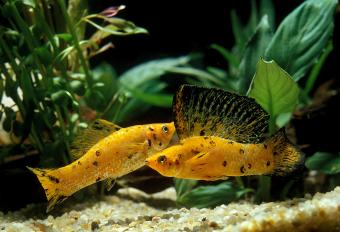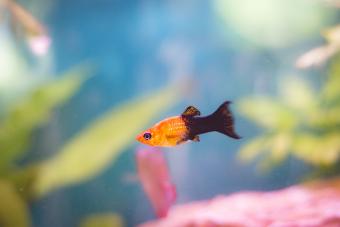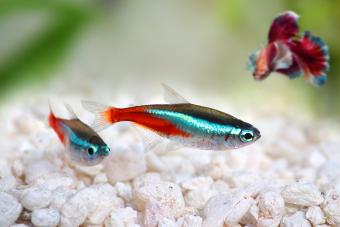
Bettas have a reputation for being solitary fish. They are often kept alone due to their territorial behavior and their tendency to fight with other fish, especially those of the same species. While you can't add a male betta to another male's tank, there are other types of fish that can bring more life to your betta's aquarium.
1. Neon Tetras

Neon tetras are small, non-aggressive fish with striking, metallic blue and red stripes. Their peaceful demeanor and diminutive size make them ideal tank mates for betta fish. Neons are docile enough to be kept with bettas, and their small size plus their clear fins mean most bettas will leave them alone. Moreover, their schooling nature adds an animated dynamic to the tank.
Offer a varied diet - including foods specifically made for bettas - to ensure both species are getting their required diet, as neon tetras are omnivorous and bettas are carnivorous.
2. Peppered Cory Catfish
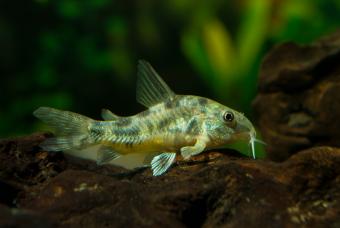
Keeping peppered cory catfish in a betta tank can make for a harmonious environment due to the complementary nature of each species' behaviors. Cory catfish are peaceful, bottom-dwelling fish that are unlikely to incite the territorial instincts of a betta fish, which usually occupy the middle and top sections of the tank.
However, to ensure a comfortable habitat for both, make sure your tank is a minimum of 20 gallons. This allows sufficient space for the cory catfish to school, which is important as they are social fish and prefer to be in groups of at least five.
Both betta fish and cory catfish appreciate a well-decorated tank with plenty of hiding spots. Leaf litter, driftwood, and caves are great additions for cory catfish, while betta fish appreciate plants and floating logs. Cory catfish can help keep the tank clean by scavenging for uneaten food and algae, but you also need to provide them with a balanced diet suitable for bottom feeders.
3. Harlequin Rasboras

These brightly colored, small fish are excellent betta companions. Harlequin rasboras can make great companions in a shared tank due to their peaceful nature. They're a schooling species, so it's recommended to have a group of at least six.
As for tank conditions, a 20-gallon tank is typically a suitable minimum to provide enough room for both species. It's important to incorporate lots of plants and hiding places to create breaks in their lines of sight, which can help prevent potential territorial disputes.
4. Kuhli Loaches

Kuhli loaches can be a good fit for a betta tank given their non-aggressive and bottom-dwelling habits. Being nocturnal, they come out mostly at night when your betta is less active, reducing the chance of territorial disputes.
Kuhli loaches are also schooling fish and should be kept in groups of at least three to six for their comfort. Kuhli loaches prefer tanks with soft, sandy substrate, as they are known to burrow. Adding plenty of hiding spots like caves, driftwood, and leaf litter is also beneficial for these shy creatures. Both betta fish and kuhli loaches thrive in similar water conditions, making them compatible tank mates.
As soon as you begin considering tankmates for your betta, start thinking bigger. A 20-gallon tank or larger is advisable to provide enough room for both species.
5. Ember Tetras

Ember tetras are a good all-around fit for betta tanks. For one thing, they're smaller than bettas, and they tend to keep to themselvs. Due to their peaceful nature and the fact that they inhabit different areas of the tank, they shouldn't give your betta any problems.
Ember tetras tend to swim in the middle areas of the tank, while bettas generally stay nearer to the surface. Being a schooling fish, ember tetras should be kept in groups of at least six to ten, providing a beautiful spectacle as they move together. It's essential to have a suitably large tank to provide ample space for both species.
Both ember tetras and betta fish appreciate tanks with plenty of plants and hiding spaces. Almost all freshwater aquarium fish do better in planted setups.
6. Pygmy Corydoras

Introducing pygmy corydoras to a betta tank can bring a new level of dynamism and diversity to your aquarium setup. Pygmy corydoras are small, peaceful, non-aggressive fish that spend most of their time in the bottom section of the tank, reducing the chances of provoking the betta's territorial instincts.
Because pygmy corydoras are schooling fish, it's best to keep them in groups of at least six. Both species appreciate a well-planted tank with lots of hiding spots. A sandy substrate is especially beneficial for pygmy corydoras, as they like to rummage through it for food.
Even though pygmy corydoras can help keep the tank clean by eating leftover food, it's important to feed them a proper diet that meets their specific nutritional needs.
7. Endler's Livebearers
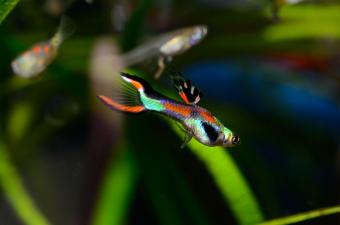
Endler's livebearers, with their vibrant colors and peaceful temperament, can make wonderful tank mates for a betta fish, adding a splash of brightness to your aquarium. These small, active fish are fast swimmers. They are also hardy and adaptable, making them compatible with bettas in terms of water condition requirements.
While these fish are mostly plant-based eaters, they will appreciate a diverse diet that includes both plant matter and small, live foods. It's important to closely monitor your betta's behavior when introducing Endler's livebearers, as the betta may display aggression, especially if the tank is too small or lacks enough hiding places.
8. Bristlenose Plecos

Bristlenose plecos fit right in with bettas. Their peaceful nature and tendency to dwell at the bottom of the aquarium reduces potential territorial clashes with your betta. These unique-looking creatures are known for their algae-eating habits, helping keep the tank clean. However, they also require a diet supplemented with vegetables and sinking pellets to meet their nutritional needs.
The water parameters suitable for betta fish are generally compatible with the needs of bristlenose plecos. Still, it's always important to monitor the interactions between your betta and its new tank mate, as individual betta personalities can vary. With the right environment, bristlenose plecos can coexist peacefully with betta fish, adding an exciting element to your aquarium.
9. Otocinclus Catfish

Most bottom-dwelling fish are natural choices for betta tanks. Otocinclus catfish can be an excellent choice because they have peaceful temperaments, remain small, and live mostly on the bottom. As algae eaters, otocinclus catfish can help maintain cleanliness in your tank.
They are also relatively non-intrusive, spending most of their time sucking on plant leaves and aquarium glass, thereby avoiding any potential territorial disputes with your betta. Both species prefer similar water conditions, which makes them a good match.
Otocinclus are schooling fish and thrive best in groups of three or more.
10. Guppies

Guppies are often brought up as suitable tankmates for bettas. However, if you go for fancy guppies, be aware that their bright finnage can attract unwanted attention from your betta. Take care if you add brightly colored male guppies in with your betta.
If your tank is large enough with plenty of hiding spots, and you add several guppies, including females or duller males, the setup can work. Guppies are friendly and energetic, and enjoy the upper areas of the tank. Both guppies and betta fish appreciate plenty of plants in their tanks, which can help diffuse tension and create boundaries within the tank.
Be prepared to monitor your betta's behavior closely when introducing guppies, as some bettas may be more aggressive than others. Despite the potential challenges, with the right planning and ongoing observation, it's possible for guppies and bettas to share an aquarium.
Fancy guppies have flowing fins that can attract betta aggression. Avoid adding a single, large male guppy, especially if it's a fancy variety with darker colored fins.
Never Keep These Fish With Bettas
Bettas are sensitive when it comes to what fish they will tolerate in their tank. Also, bettas do just fine on their own, so you don't have to add tankmates just to keep them happy. There are some fish they will absolutely never accept in their tank:
- Other bettas: Betta fish are territorial and can become hostile, especially when housed with other bettas, particularly males.
- Gouramis: Gouramis prefer their own territory and will fight the betta for it until one or the other dies. The gourami will likely win by harming the betta's sensitive fins.
- Tiger barbs: Tiger barbs tend to nip at other fish and will quickly tear apart your betta's fins.
- Goldfish: Betta fish require warmer temperatures to stay healthy, whereas goldfish do best in cooler water.
- Cichlids: Cichlids are extremely territorial and two territorial fish species being placed in the same tank can lead to disaster.
Keep an Eye on the Tank
Remember, not all bettas are alike, and what works for one may not work for another. Always monitor the tank carefully when introducing new companions to ensure everyone gets along. Pick a tank of the proper size, provide plenty of hiding spots, and maintain good water conditions to help ensure your fish enjoy peaceful coexistence.





